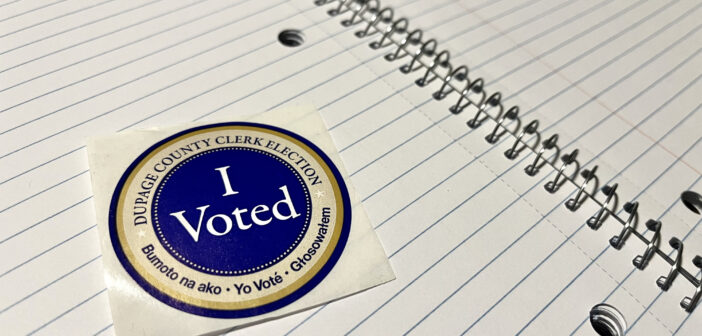College student voters are ready to have their voices heard in this presidential election. The institutions they are attending are helping them perform that task as well. But with a list of issues to assess, what is on their mind this time around?
Key issues
One key issue that has generated concern is women’s reproductive freedom and health. This discussion especially heightened with the overturning of Roe v. Wade in 2022.
A survey conducted by GenForward found that 44% of those aged 18-26 strongly disagreed with the Supreme Court’s ruling. Jayden Lawrence, ‘27, thinks that reproductive choices should be left to women themselves.
“As a man, I feel like it’s not my business to get involved with a woman’s reproductive rights or her ability to choose,” Lawrence, ‘27, said. “But also as a religious person, there is always the argument of religion brought into these conversations. One thing that I will always say is that religion is expansive and continually evolving.”
However, some of the key issues college student voters are concerned about go beyond the ballot itself. Because of what transpired on Jan. 6, 2021, it has increased the distress of what could happen this election.
A number of voters, including Paloma Mena, ‘28, expressed worries about the peaceful transfer of power. Mena, ‘28, finds that the strain in political conversations might cause disruptions to becoming a united nation.
“Tensions between people rise when as a society, we are unable to come together and address a new period of politics with a sense of dignity and respect for democracy,” Mena, ‘28, said. “When tensions get higher, the already seemingly slim chance of open political discourse becomes impossible. With no sense of mutual respect and lack of understanding, how are we going to solve issues that we all collectively face? Can anything get done if we continue to alienate the ‘other side?’”
Knowing what issues they care about the most, students will fill out their ballots. Additionally, colleges in different states are aiding their community members to do just that.
Encouraging students to vote
No matter one’s political affiliation, colleges across the nation are encouraging students to vote. Schools have brought the polls to students and others have helped them with the registration process.
Rachel Leingang and Victoria Bekiempis of The Guardian reported that the University of Minnesota had a one-day pop-up polling event. Hence, students could easily access early voting. Likewise, NCC’s Student Governing Association also motivated students to participate in this year’s election. In an email sent to students, the SGA wrote, “We know that it can sometimes be time consuming or confusing to attempt to register online, so we are hosting a Voter Registration Drive.”
On the other hand, there has been voter discouragement circulating around. Recently in Wisconsin, a swing state, an ominous text sent to college students caused confusion. In a letter, a public interest group called Free Speech for People alerted U.S. Attorney General Merrick Garland and Wisconsin Attorney General Josh Kaul regarding this matter.
“WARNING: Violating WI Statutes 12.13 & 6.18 may result in fines up to $10,000 or 3.5 years in prison. Don’t vote in a state where you’re not eligible. STOP2END,” the text read.
Whether it be phishing messages or the frustration that may come with voting, many have felt the weight of this election season. Yet Mena, ‘28, wants to remind her fellow peers about the importance of getting their voice heard.
“For many college students, this election season will be the first time they can make their own decisions regarding what they believe in and what issues they want to stand for,” Mena, ‘28, said. “There is a growing conversation among young people that their votes do not matter. However, voting on the local and state level can impact us more than we realize. As participants in a democracy, it is our constitutional right to vote, so why wouldn’t we?”
Appealing to young voters
Political candidates are using social media platforms to spread their campaign messages in an effort to appeal to young voters. Similarly, celebrities and other famous influencers are utilizing their voice to support certain candidates and parties.
Singer-songwriter Charli XCX used X (formerly Twitter) to show support for Vice President Kamala Harris. Her Tweet saying “kamala is brat” caught the attention of a younger audience. Vice President Harris went along with this trend and used it in her campaign to reach younger people.
The future
Showing up for this election can impact the future. College students voters are the youngest population to cast their ballots, so they may feel pressure placed on them.
An American Psychological Association (APA) survey found that 69% of U.S. adults are worried about the 2024 election. Yet, exercising one’s First Amendment right is crucial to contributing to our democracy. And as Mena, ’28, put it, “We can incite change for the better.”


1 Comment
Pingback: Holiday spending season- retailers prepping and shoppers planning - NCClinked